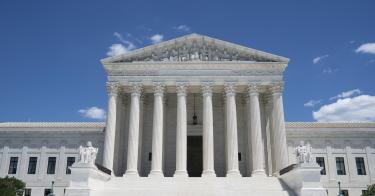Since the founding days of the republic, people of faith have joined together to serve their neighbors and instruct their children in their beliefs. And, the First Amendment to the Constitution makes protecting their freedom to do so one of the government’s most basic obligations.
The Supreme Court last week handed down two welcome and important decisions in two religious liberty cases: Little Sisters of the Poor v. Pennsylvania and Our Lady of Guadalupe School v. Morrissey-Berru.
But it shouldn’t have taken an intervention from the Supreme Court to affirm the basic principle that faith-based organizations have the right to operate in accordance with their beliefs and to decide who can teach their faith to students—without interference from the government.
The Little Sisters of the Poor are a group of Catholic nuns who dedicate their lives to those deemed most disposable by society—the sick and elderly in need. During the COVID-19 pandemic, the Sisters have cared for those most vulnerable to the virus and tended to the dying, all at high risk to themselves.
And yet, for nearly eight years, these nuns have been entangled in endless court battles as they seek to protect their right to operate in accordance with their deeply held religious beliefs.
>>> SCOTUS 101: A weekly podcast that breaks down what's happening at the Supreme Court
The Little Sisters had already made one trip to the Supreme Court to defend themselves against the Department of Health and Human Services’ mandate requiring religious employers to provide contraceptives and abortifacient drugs, and they were forced to endure another round of time- and resource-consuming litigation when state governments challenged the religious exemption the Sisters were granted by the Trump administration.
In a 7-2 decision, the Supreme Court ruled that the federal agencies in question do, indeed, have the authority to broaden the religious exemption to the contraceptive mandate and that they followed the necessary procedural rules in doing so.
While the court was right to uphold the expanded exemption, it failed to resolve the underlying issue: whether the Religious Freedom Restoration Act requires the government to accommodate religious organizations’ objections to providing abortifacients. By dodging the central question in this case, the majority has all but ensured that the Little Sisters of the Poor will end up in court again.
Back in 2012, the Supreme Court affirmed in the Hosanna-Tabor case that federal employment discrimination laws could not be applied to religious organizations’ selection of religious leaders. This week’s decision in Our Lady of Guadalupe School upheld this precedent.
It further held that the ministerial exception covers teachers at religious schools who are responsible for instructing children in the faith, restricting the government’s ability to impose arbitrary, formalistic tests to determine who qualifies as a minister.
The idea that faith-based schools should have the right to staff those schools with employees who will uphold their mission of passing down their beliefs to the next generation should be non-controversial, but it took a lengthy process of litigation to clarify this.
Religious liberty is a fundamental American right. It includes not just the right to worship freely but also the right to live out religious beliefs both in the public square and within organizations founded on the basis of those beliefs. The Supreme Court’s rulings in these two recent cases reinforced this truth, but the reality is that the current state of affairs still falls short of the Constitutional ideal.
An America that truly values and respects faith-based institutions’ contributions to the nation will not seek to prevent the Little Sisters of the Poor from serving those in need with capricious regulations or appoint itself the arbiter in Our Lady of Guadalupe School’s decisions on how to teach the faith.
While the Court got it right in these cases, there is still a long way to go toward protecting true religious liberty for all Americans.
This piece originally appeared in Inside Sources



